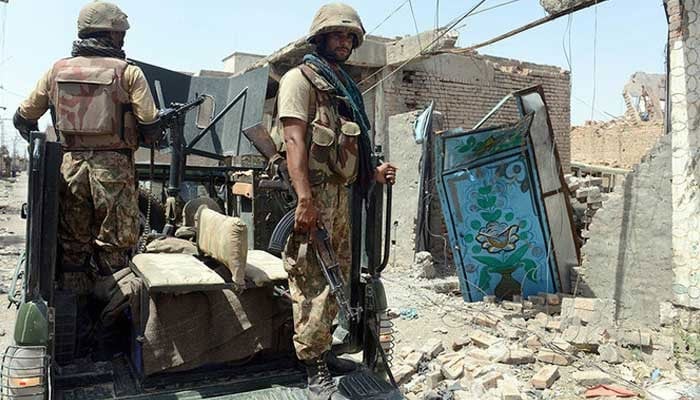Unrelenting resurgence
This week, terrorists struck in Kohat, Bajaur areas of KP leaving around 9 people including up to 8 police personnel dead
Last year’s resurgence in terror attacks looks set to continue into 2024. The year has barely begun and already we have seen at least two deadly attacks. This week alone, terrorists struck in the Kohat and Bajaur areas of Khyber Pakhtunkhwa, leaving around nine people, including up to eight police personnel, dead. The attack in Bajaur was particularly concerning as it appeared to target a polio vaccination team, imperiling this country’s drive to rid itself of the ignominious title it shares with Afghanistan of being the only countries where the wild poliovirus remains endemic. There is also the impact of these attacks on the upcoming elections, ostensibly less than a month away, to consider. The JUI-F, a key member of the previous governing coalition, has been attacked at least three times in the past six months, with around 44 people being killed by a blast during a convention organized by the party in Bajaur last July. Jammat-e-Islami ameer Sirajul Haq also narrowly escaped a suicide attack on his convoy in the Zhob area of Balochistan in May 2023.
With a former PM and arguably the country’s most popular leader already behind bars, an election conducted under the spectre of these attacks might fuel even more doubts about its credibility. However, it is important to acknowledge that the political instability of the past two to three years is likely one of the root causes of this terror resurgence, underscoring the need for an elected government at the helm and timely elections. It is essential for the authorities to create an atmosphere where all parties feel that they can campaign without fear of harm in the lead up to the polls.
JUI-F chief Maulana Fazlur Rehman’s Monday meeting with the Afghan Taliban government’s PM and acting foreign minister appears to have been a step towards improving ties with our western neighbours and addressing the ability of terror groups hostile to Pakistan, such as the TTP, to find a sanctuary across the western border. Sadly, this week’s attacks do not say much for the progress this meeting made and a similar trip led by Mufti Taqi Usmani in 2022 had similarly disappointing results. It is hoped that those quarters who welcomed and celebrated the return of the Afghan Taliban to power are now looking at some of their policies and their attitude towards extremist outfits in general, in a different light. In the immediate-term, Pakistan must strengthen its internal defences. Our efforts to defeat terrorism need to be better organized, which will require strengthening Nacta. In particular, the role of the police as our first line of defence against terrorism must be recognized and they must be equipped with training, equipment and other resources that allow them to cope with such an important role. It is also important not to repeat past mistakes. The PTI government’s attempts to engage and negotiate with the TTP were, in the eyes of many, doomed to fail and the events of this and last year seem to back up this view.
-
 Leonardo DiCaprio's Co-star Reflects On His Viral Moment At Golden Globes
Leonardo DiCaprio's Co-star Reflects On His Viral Moment At Golden Globes -
 SpaceX Pivots From Mars Plans To Prioritize 2027 Moon Landing
SpaceX Pivots From Mars Plans To Prioritize 2027 Moon Landing -
 J. Cole Brings Back Old-school CD Sales For 'The Fall-Off' Release
J. Cole Brings Back Old-school CD Sales For 'The Fall-Off' Release -
 King Charles Still Cares About Meghan Markle
King Charles Still Cares About Meghan Markle -
 GTA 6 Built By Hand, Street By Street, Rockstar Confirms Ahead Of Launch
GTA 6 Built By Hand, Street By Street, Rockstar Confirms Ahead Of Launch -
 Funeral Home Owner Sentenced To 40 Years For Selling Corpses, Faking Ashes
Funeral Home Owner Sentenced To 40 Years For Selling Corpses, Faking Ashes -
 Why Is Thor Portrayed Differently In Marvel Movies?
Why Is Thor Portrayed Differently In Marvel Movies? -
 Dutch Seismologist Hints At 'surprise’ Quake In Coming Days
Dutch Seismologist Hints At 'surprise’ Quake In Coming Days -
 Australia’s Liberal-National Coalition Reunites After Brief Split Over Hate Laws
Australia’s Liberal-National Coalition Reunites After Brief Split Over Hate Laws -
 DC Director Gives Hopeful Message As Questions Raised Over 'Blue Beetle's Future
DC Director Gives Hopeful Message As Questions Raised Over 'Blue Beetle's Future -
 King Charles New Plans For Andrew In Norfolk Exposed
King Charles New Plans For Andrew In Norfolk Exposed -
 What You Need To Know About Ischemic Stroke
What You Need To Know About Ischemic Stroke -
 Shocking Reason Behind Type 2 Diabetes Revealed By Scientists
Shocking Reason Behind Type 2 Diabetes Revealed By Scientists -
 SpaceX Cleared For NASA Crew-12 Launch After Falcon 9 Review
SpaceX Cleared For NASA Crew-12 Launch After Falcon 9 Review -
 Meghan Markle Gives Old Hollywood Vibes In New Photos At Glitzy Event
Meghan Markle Gives Old Hollywood Vibes In New Photos At Glitzy Event -
 Simple 'finger Test' Unveils Lung Cancer Diagnosis
Simple 'finger Test' Unveils Lung Cancer Diagnosis




